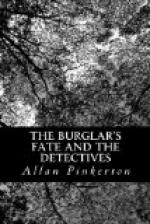“As I have said, I met Johnson at this time, and on my succeeding visit I was introduced by him to Eugene Pearson, the assistant cashier of the bank. That evening we spent together at Johnson’s office in drinking and card-playing. Johnson stated that there was an excellent opportunity to make money offered, if we were disposed to accept it. I asked him what it was, and he stated that there were quite a number of well-to-do merchants in the town who were in the habit of meeting in a room which they had furnished for the purpose, and where they played cards for small amounts and for amusement.
“Johnson stated that we could readily make their acquaintance, and once introduced into their games, it would be an easy matter to induce them to play heavily, and then, from his knowledge of gamblers’ tricks, we could win their money in spite of them. We all agreed to this, although Pearson declined to become an active player, because of his position in the bank.
“On the next visit I made to Geneva, I remained over Sunday, and being taken to the club, we managed to win several hundred dollars before morning. This continued for some time, and always with the same success, and as a consequence I became more reckless in my expenditure of money than ever before, because I knew of a sure plan to replenish my pockets, when they were empty. Shortly after this, I received a letter from Johnson requesting me to come to Geneva as soon as possible, as he and Pearson had devised another scheme to raise money and wanted my assistance. Being hard pressed at that time, I responded as soon as I could, and in a few days found myself in Geneva, where I was heartily welcomed by both Johnson and Pearson. After supper we met in Johnson’s office as usual, and then the plan was made known to me. At first I was startled by the daring proposition, which was nothing more or less than to rob Pearson’s bank by means of forged checks. The checks, which had been already prepared by Pearson, were exhibited to me, and I was surprised at the cleverness of the forgery. It looked easy and safe, and I consented. The person selected as the victim was a rich farmer by the name of Henery Sharpless, whose accounts were only settled about twice a year, and consequently detection was not likely to follow very soon. After carefully comparing the forged checks with an old one that was genuine, I no longer hesitated and signified my readiness to try the experiment.
“On the following day, therefore, I went to Johnson’s office, and there put on a hickory shirt, a pair of coarse boots and pantaloons, and in a few minutes I was transformed into a veritable countryman. Johnson colored my face and hands with some preparation which made me appear like a tanned and sunburnt farmer, and thus equipped, I started for the bank. I was provided with two checks for three hundred dollars each, one of which was to be presented to the Geneva bank, when, if I experienced no trouble, I was to




